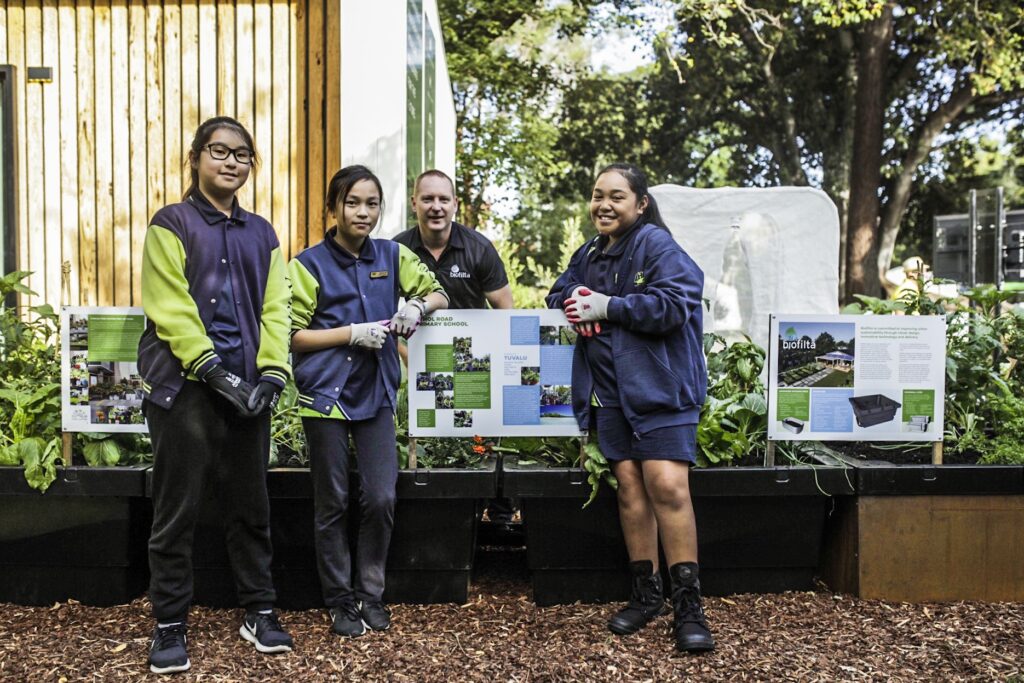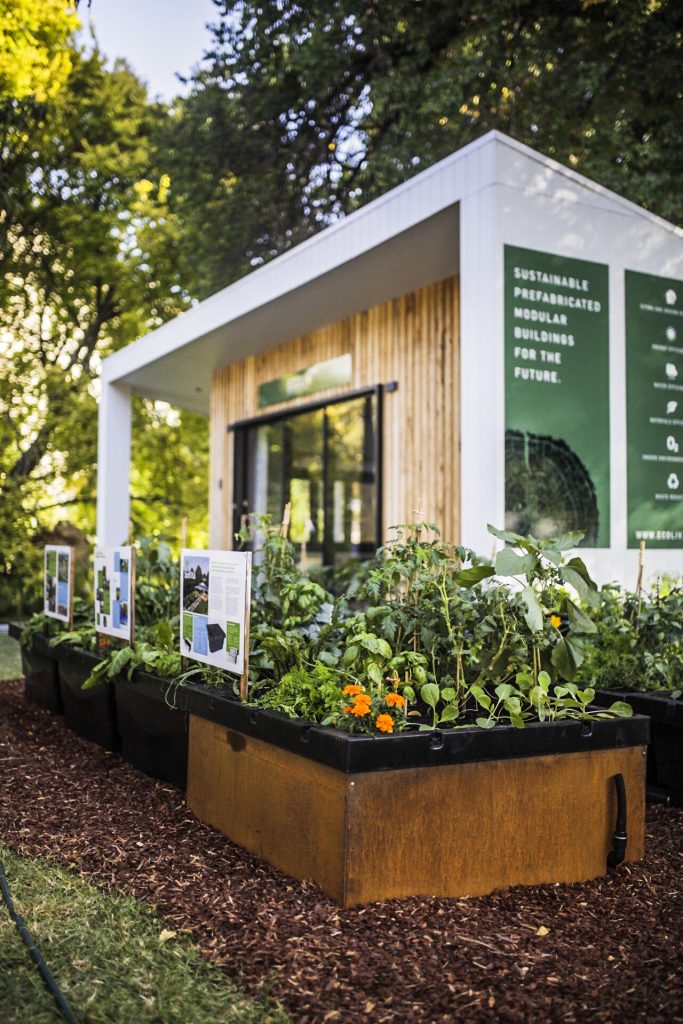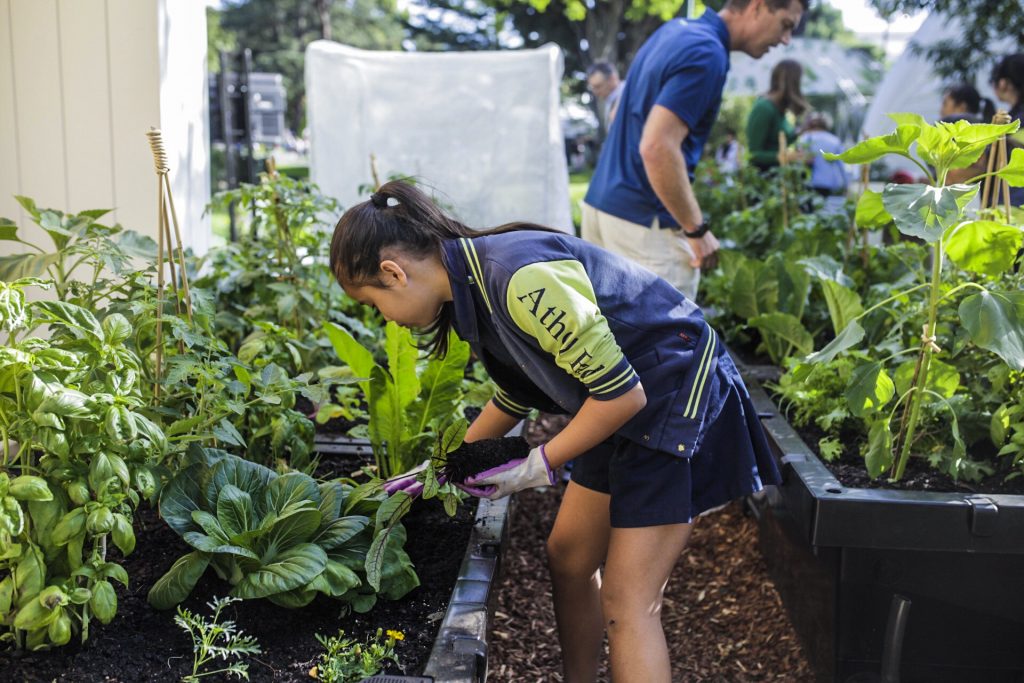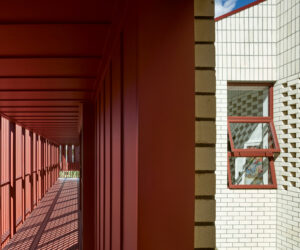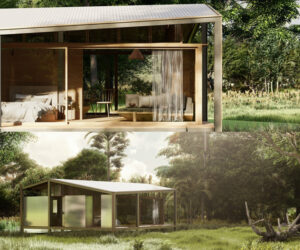Biofilta launches innovative pop up urban farming system
Biofilta, a leading Australian urban farming and stormwater harvesting company, has joined forces with injection moulding company, Von Pace Group, to officially launch a Melbourne designed and manufactured urban farming system that is set to transform city spaces into highly productive, efficient urban farms, and turn cities into food growing powerhouses. Over five years of research and development, and a combined $6 million in investment by the two companies, has created the most water efficient, affordable, versatile, eco-friendly, modular urban farming system on the market, “Foodcube”.
Foodcube is a large one-square-metre injection moulded, self-watering urban farm that has been precision designed, developed and manufactured in Melbourne. The system allows rapid assembly of instant urban farms ranging in size from one square meter to thousands of square meters. The urban farming system is tanked and sealed, allowing the garden to be rapidly assembled on rooftops, carparks, backyards, courtyards, schools and a huge variety of public and private spaces. Trial gardens developed by Biofilta are generating over 20 kilograms of fresh produce per-square-metre per annum, and when connected in series, are able to generate tonnes of fresh produce from small city spaces.
Biofilta Foodcube urban farms are:
Simple to operate and soil based, and allow the creation of efficient, productive pop up farms at workplaces, households or communities, to capture, compost and transform valuable organic waste streams into fresh produce, creating circular economy, closed loop, food secure cities.
- Designed for rapid assembly, allowing very large modular farms, capable of creating tonnes of fresh produce, to be assembled by small teams within days, and to be creating fresh produce within weeks
- Water storage tanks, with each square-metre Foodcube module storing a large reservoir of 110 litres of stored water, held in the base of the unit. The advanced wicking bed system uses capillary action to keep plants watered, making the system highly water efficient and low maintenance, storing enough water to keep the garden hydrated for a week during Summer and up to a month during winter
- Able to capture and utilise rooftop rainwater runoff, retaining this resource in our neighbourhoods, improving downstream water quality and helping to cool cities in a hotter climate
- Low maintenance, with clever design retaining water at the base and away from surface weeds, reducing weed growth compared to conventional soil-based gardens
- Ergonomic, raised off the ground, reducing bending and back strain for gardeners
- Manufactured in South East Melbourne from UV stabilised, long life, durable, food-grade waste stream plastic that is diverted away from landfill, reducing Australia’s plastic waste problem
- Affordable to buy, with the use of precision injection moulding equipment allowing for mass production of the modules and reduction of cost
- Able to comfortably produce over 20 kilograms of produce per square meter per annum based on our test farms, with a less than two-year payback
- Designed to attach netting and lattices that keep pests away from valuable produce, as well as grow vertical crops such as tomatoes and vines
The multimillion dollar partnership will see the Foodcube available nationally and internationally, in areas that have food security and nutrition challenges – not only in developing countries, but also in highly dense and populated capital cities.
According to Biofilta CEO, Mr Marc Noyce, urban areas are becoming increasingly dense and the traditional home vegetable garden is shrinking or being lost, resulting in whole generations losing their connection with food and the ability to be self-sufficient.
“Our system is designed for people looking to grow large amounts of produce in their backyards and available spaces, to improve health, nutrition in their neighbourhoods and communities. Resilient, durable and built to last, our farming system is currently being deployed to Tuvalu, a Pacific Island community, to improve food security and nutrition in a program in conjunction with the Department of Foreign Affairs and Trade. Food security and nutrition isn’t just an issue for developing countries. We have nutrition deserts in the heart of Melbourne. We are very proud to partner with leading injection moulding company Von Pace Group, to help champion our urban farm strategy.”
Von Pace Group is an Australian family-owned company with over 40 years of experience in plastic manufacturing/injection moulding. They have been supplying a large range of injection moulded products and parts for the automotive industry. Von Pace Group has extensive experience in assisting with specialised custom injection moulding and tooling requirements for customers in the automotive and other industries. Due to the downturn in the local automotive industry, Von Pace Group has sought to diversify its operations and is excited to move into the urban food industry in partnership with Biofilta.
Christian von Schassen, Von Pace Group Manager, praised the work of Production Manager Fred Endres who has worked tirelessly to provide Biofilta with tooling expertise, production and warehousing logistics in order to bring a world-class product to market at a competitive price. Due to the size of the machinery required, over 20 metres in length, the company acquired the factory next door to their existing operations to house the machinery and warehouse the product for a total investment of approximately $5 million. “Having the parts made, warehoused and dispatched from the one location minimises handling and freight costs, which is great for the end user,” said Mr von Schassen.
Foodcube is made with UV stabilised food-grade plastic and a high percentage of the product (over 80 per cent) comes from a waste stream destined for landfill. “Mixed with UV stabilisers, this material is a perfect feedstock for the Foodcube and because we know where it comes from, we know it is food safe,” says Mr von Schassen. “The Foodcube unit is also able to be recycled at end of life with the plastic able to be used for additional durable plastic products, which helps close the loop on plastic waste in our manufacturing process in future.”
Biofilta Director, Brendan Condon says, “We are seeing a huge shift in populations towards cities and less and less space to feed ourselves with growing challenges in cities including water shortages, reduced space, contaminated soils and a heating climate. Biofilta drew upon our engineering and horticultural expertise to develop food-growing systems that tackle increasingly hotter conditions.”
“Spatial and water constraints and a general lack of food growing knowledge to allow cities to be transformed into productive food growing areas. Our system makes growing food easy, cheap, fast and water efficient. The self-watering, sealed and modular systems are soil based, allowing people to compost their green waste and reuse those nutrients instead of going to landfill. Every neighbourhood can now become a closed loop, productive urban farm.”
Biofilta recently designed and built a test farm using a similar design to Foodcube, occupying two car spaces in a factory in Port Melbourne, and this farm has produced more than 300 kilograms in less than six months, or more than 150 kilograms of food per 12-metre-square car space.
Biofilta has recently announced a large roof top urban farm project: Melbourne Skyfarm (melbourneskyfarm.com.au) and this video shows our two car space test farm as well as our proposed rooftop farm, set to be built in 2020 in Melbourne. Melbourne Skyfarm will feature a Biofilta pop up farm using Foodcube as the centrepiece and is set to produce over five tonne of fresh produce per annum, using composted organics from the South Melbourne Market, to showcase city scale closed loop food production.
The Foodcube, retailing at $399, is available online, and at selected nurseries around Australia including Gardenworld.
Peninsula Health have also shown interest in the Foodcube system for therapeutic and mental health benefits for patients as well as use in the hospital and are pleased to announce a trial garden will be implemented at the Frankston Hospital to evaluate the product.
